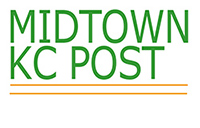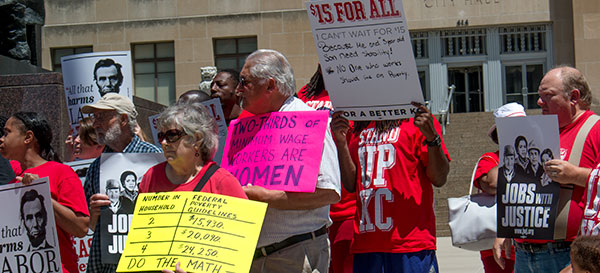Five citizens for and five against a city minimum wage hike skirmished Monday.
Facilitators only had to hit a loud ding button twice when things got too raucous.
The city plan is for the group to continue meeting each Monday afternoon until July 13 – three days before a council vote on a higher minimum wage.
The hope is that some kind of compromise can be reached.
On Monday, facilitator Allan Katz, a UMKC Professor, told each side to present the three worst things they saw happening if they did not get their way.
For the advocates:
• Low incomes on the east side will continue to stymie development there because developers say its residents don’t have the income to support projects.
• There will be further deterioration of public health and public safety because of the correlation between poverty, crime, poor health and other social problems.
• Low wages create poverty and also high public costs. In Missouri one recent year, governments spent $644 million for social programs to help low-income workers.
For the business groups:
• There will be job losses, as employers cut jobs and reduce worker hours. That comes with future job losses from companies who will instead start up in other cities.
• There will be price increases for everyone, increases that will be hardest on the poor and the fixed-income elderly.
• Small business will be unable to compete with large corporations, and they and the entrepreneurial spirit will be crushed.
Jason Pryor, of the Greater Kansas City Restaurant Association, said raising the minimum wage will not decrease poverty.
The $7.65 state minimum has increased 49 percent in a decade and poverty is still here, he said.
Advocates are asking for $15 an hour by 2020 and Mayor Sly James has suggested $13 an hour.
Mike Enriquez, director of Stand up KC, spoke for advocates at the Monday meeting. He said that if the federal minimum wage, now $7.25, had just kept up with inflation since 1968, it would now be $11.11.
A study determined that it the wage would have to be $21 an hour for a single parent to properly raise one child, he said.
Bud Nicol, director of the Hotel and Lodging Association of Greater Kansas City, said some jobs are only worth so much, and a big wage increase will drive businesses from the city.
Vernon Howard, president of the Southern Christian Leadership Conference, said the national movement to raise the minimum wage goes beyond how much it is worth to cook burgers or mop floors.
It is shifting the issue to “the economic value of that person,” he said.
Business leaders said part of the problem is uncertainty. They suggested triggers in the wage law that would halt the periodic increases, things like cost of living benchmarks.
Advocates said they reject triggers.
At the end of two hours, Katz said, they had made some progress.
The advocates said they are willing to work toward a path forward, he noted. There was also talk of having a lower minimum wage for those 16 years old or younger.
Katz said business leaders, facing some higher minimum wage, should examine options to make it more acceptable, like the age differences or some kind of triggers.
Katz said the group also will start compiling and sharing studies from elsewhere that were not paid for by those supporting one side of the issue or the other.




Who’s talking